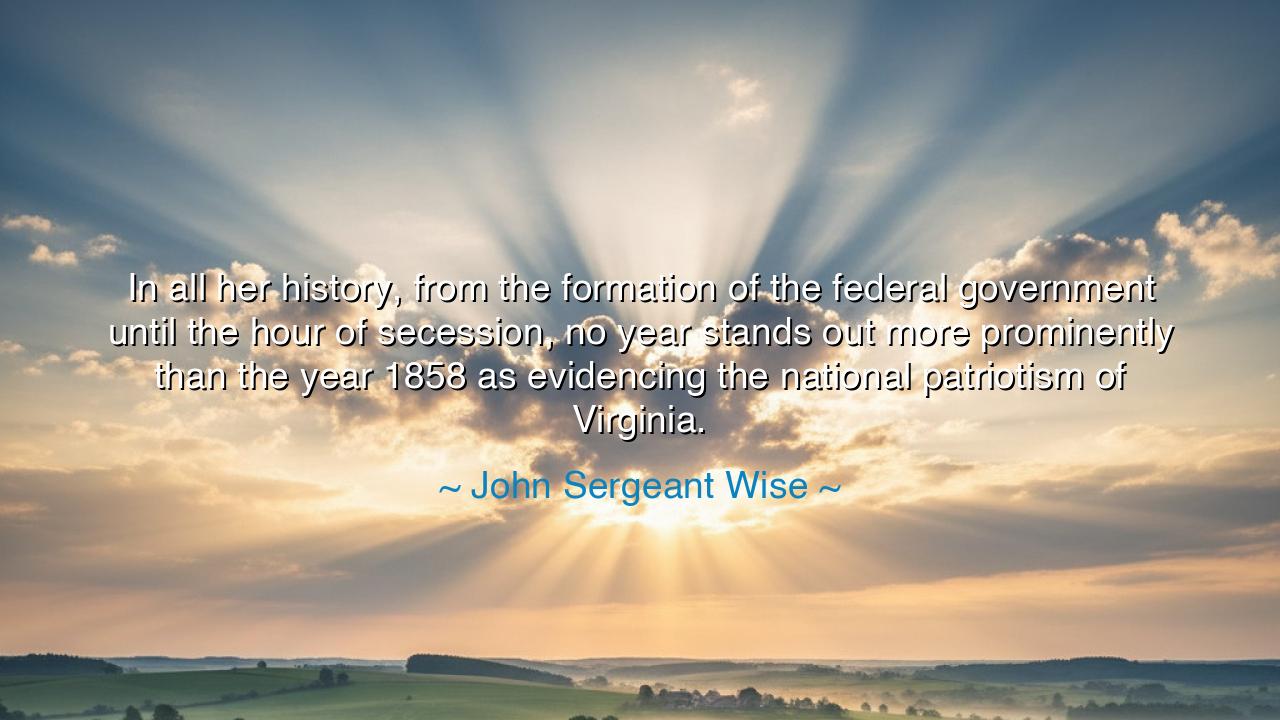
In all her history, from the formation of the federal government
In all her history, from the formation of the federal government until the hour of secession, no year stands out more prominently than the year 1858 as evidencing the national patriotism of Virginia.






The words of John Sergeant Wise—“In all her history, from the formation of the federal government until the hour of secession, no year stands out more prominently than the year 1858 as evidencing the national patriotism of Virginia.”—sound like a trumpet call from the pages of America’s past. They summon us to remember that even in an age of division, when storms gathered upon the horizon of the republic, there were moments when the spirit of unity still shone brightly. For Wise, a son of Virginia and himself a man of the tumultuous nineteenth century, the year 1858 marked not a time of collapse, but a moment when the Old Dominion stood as a beacon of loyalty to the Union, her heart still beating with national patriotism.
To understand these words, one must see them against the backdrop of history. By 1858, America was already on the path toward crisis. The debates over slavery grew fiercer; the balance between free states and slave states was fragile; the bonds of Union strained. The Lincoln-Douglas debates that year echoed through the land, foreshadowing the greater conflict to come. Yet even then, Virginia—long seen as the mother of statesmen, the birthplace of Washington, Jefferson, Madison, and Monroe—still declared her devotion to the federal Union. This fidelity, Wise reminds us, was a moment of noble clarity before the darkness of secession descended.
Virginia’s patriotism in 1858 can be seen in her actions and her voice. Though slavery remained a reality within her borders, her leaders and her people sought still to hold the fragile fabric of the Union together. They participated in the debates of the time, striving to reconcile sectional tensions. Wise calls us to see this year as a cresting wave of loyalty, before the tide of disunion swept the state into the currents of war. In this sense, 1858 stands as a paradox: both a high-water mark of unity and a prelude to fracture.
Consider the memory of George Washington, whose spirit still loomed over Virginia in those days. His legacy was invoked often in political speeches, his warnings against division remembered, his love for the Union cited as sacred scripture. To claim kinship with Washington was to claim fidelity to the Republic itself. In 1858, Virginians still clung to this inheritance, and their national patriotism shone brightly in their commitment to the Union—even as storm clouds thickened. This was the glory Wise remembered: a final moment when Virginia’s heart beat in harmony with the nation she had helped to create.
But within only a few short years, that devotion would fracture. By 1861, the call of secession overwhelmed the spirit of 1858, and Virginia, torn between loyalty to the Union and loyalty to her sister states of the South, chose the latter. Brother fought brother, and the very soil of Virginia became one of the bloodiest battlegrounds of the Civil War. Wise’s words, written after those days, therefore carry both pride and sorrow: pride for the loyalty of 1858, sorrow that such loyalty could not withstand the storm.
The deeper meaning of this teaching is clear: patriotism must be constant, or it perishes. A single year of unity cannot sustain a nation if the years that follow abandon it. To be true patriots, men and women must carry fidelity not only in moments of calm, but through trial, temptation, and conflict. Virginia’s devotion in 1858, though bright, was fleeting; it reminds us that patriotism must be renewed daily, lest it fade when most needed.
For us who inherit these lessons, the call is simple yet profound: do not wait for crisis to prove your loyalty. Practice patriotism now, in days of peace and of strife alike. Speak for unity, labor for justice, and remember that the fate of a nation depends not on governments alone, but on the constant fidelity of its people. Let the story of Virginia in 1858 inspire us, but let it also caution us—for patriotism abandoned in the hour of trial is patriotism lost.
Thus, let Wise’s words echo across time: the year 1858 was Virginia’s shining moment of national patriotism. Let us learn from it, honor it, and resolve not to let our own devotion falter when the storms of division rise again. For nations live or die not in a single year, but in the enduring loyalty of their children.






AAdministratorAdministrator
Welcome, honored guests. Please leave a comment, we will respond soon